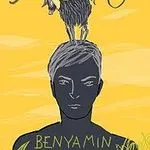
A Brief Introduction to Saudi Literature, from 18th c. Satire to 21st c. Comix
The diverse landscape of Saudi Arabia is often boiled down to oil, Wahhabism, and wealthy autocrats. Even a brief skimming of Saudi literature reveals much more: ribald poetry, superhero comix, award-winning novels, and migrant stories.
 Although there was no “Kingdom of Saudi Arabia” in the 18th century, we’ll start our exploration of Saudi literature before the Wahhabi movement. To this end, there’s Arabian Satire Poetry from 18th-Century Najd, by Hmedan al-Shwe’ir. The book will be published bilingually, edited and translated by Marcel Kurpershoek.
From publisher Library of Arabic Literature:
Although there was no “Kingdom of Saudi Arabia” in the 18th century, we’ll start our exploration of Saudi literature before the Wahhabi movement. To this end, there’s Arabian Satire Poetry from 18th-Century Najd, by Hmedan al-Shwe’ir. The book will be published bilingually, edited and translated by Marcel Kurpershoek.
From publisher Library of Arabic Literature:
 Novelist Raja Alem‘s wild, International Prize for Arabic Fiction-winning The Dove’s Necklace, co-translated by Adam Talib and Katherine Halls, is a wild ride of stories nested within stories taking a right turn into stories, embedded in more stories.
Alem is one of three Saudis to have won the 10-year-old International Prize for Arabic Fiction. She’s also the only woman to have taken Arabic fiction’s most prominent literary prize.
For readers who want to signpost themselves within this wonderful, multilayered waterfall of stories, there is Ziauddin Sardar’s acclaimed Mecca: The Sacred City. Sardar’s book presents an enjoyable, straightforward history of the city from pre-Islamic times through contemporary times.
Novelist Raja Alem‘s wild, International Prize for Arabic Fiction-winning The Dove’s Necklace, co-translated by Adam Talib and Katherine Halls, is a wild ride of stories nested within stories taking a right turn into stories, embedded in more stories.
Alem is one of three Saudis to have won the 10-year-old International Prize for Arabic Fiction. She’s also the only woman to have taken Arabic fiction’s most prominent literary prize.
For readers who want to signpost themselves within this wonderful, multilayered waterfall of stories, there is Ziauddin Sardar’s acclaimed Mecca: The Sacred City. Sardar’s book presents an enjoyable, straightforward history of the city from pre-Islamic times through contemporary times.
 English. However, several of his stories are available online.
Badriyah al-Bishr‘s novel Love Stories on al-Aisha Street was longlisted for the 2014 International Prize for Arabic Fiction. It isn’t available in English. However, her controversial novel Hend and the Soldiers — banned in Saudi Arabia — is being published in June by University of Texas Press, translated by Sanaa Dhahir.
Saudi novelist Abdulrahman Munif is one of the most significant Arab writers of the last century; his Cities of Salt quintet was chosen by novelist Sinan Antoon as one of the “five books you should read before you die.
Other acclaimed Saudi writers include poet Fawzia Abu Khaled (whose work can be found in Mothers and Daughters in Arab Women’s Literature and in Gathering the Tide), novelist Leila al-Johani (her Days of Ignorance has been translated by Nancy Roberts), and short-story writer Khadija Alnemer (shortlisted for the inaugural al-Multaqa Prize for the Arabic Short Story).
English. However, several of his stories are available online.
Badriyah al-Bishr‘s novel Love Stories on al-Aisha Street was longlisted for the 2014 International Prize for Arabic Fiction. It isn’t available in English. However, her controversial novel Hend and the Soldiers — banned in Saudi Arabia — is being published in June by University of Texas Press, translated by Sanaa Dhahir.
Saudi novelist Abdulrahman Munif is one of the most significant Arab writers of the last century; his Cities of Salt quintet was chosen by novelist Sinan Antoon as one of the “five books you should read before you die.
Other acclaimed Saudi writers include poet Fawzia Abu Khaled (whose work can be found in Mothers and Daughters in Arab Women’s Literature and in Gathering the Tide), novelist Leila al-Johani (her Days of Ignorance has been translated by Nancy Roberts), and short-story writer Khadija Alnemer (shortlisted for the inaugural al-Multaqa Prize for the Arabic Short Story).
 Literature shouldn’t be a whitewash, and thus we don’t forget those authors who are languishing in Saudi prisons. We particularly remember the gifted Palestinian poet and artist Ashraf Fayadh, whose Instructions Within — for which he is serving eight years and 800 lashes — has been translated by Mona Kareem.
You can get a copy from Operating System Press and read excerpts on Words Without Borders.
Literature shouldn’t be a whitewash, and thus we don’t forget those authors who are languishing in Saudi prisons. We particularly remember the gifted Palestinian poet and artist Ashraf Fayadh, whose Instructions Within — for which he is serving eight years and 800 lashes — has been translated by Mona Kareem.
You can get a copy from Operating System Press and read excerpts on Words Without Borders.
 Jahanamiya, which has thus far produced three issues, is “a feminist literary magazine that publishes written work exclusively by Saudi women, as well as accompanying artwork created by regional artists.”
They bring out work both in English and Arabic. Thus far, each issue has centered on a theme “that is an element of Saudi culture”: Arabic coffee (summer 2015), ismik (winter 2016), and awlad (fall 2016).
Jahanamiya, which has thus far produced three issues, is “a feminist literary magazine that publishes written work exclusively by Saudi women, as well as accompanying artwork created by regional artists.”
They bring out work both in English and Arabic. Thus far, each issue has centered on a theme “that is an element of Saudi culture”: Arabic coffee (summer 2015), ismik (winter 2016), and awlad (fall 2016).
 Migrant and immigrant lives are central to the making and maintaining of Saudi Arabia. The Malayalam novel Goat Days, written by Benyamin and translated into English by Joseph Koyippally, tells the story of a man who moves from Kerala to work in Saudi Arabia, where he undergoes a series of abuses that are based on a migrant’s true story.
This book is also banned in Saudi Arabia.
Migrant and immigrant lives are central to the making and maintaining of Saudi Arabia. The Malayalam novel Goat Days, written by Benyamin and translated into English by Joseph Koyippally, tells the story of a man who moves from Kerala to work in Saudi Arabia, where he undergoes a series of abuses that are based on a migrant’s true story.
This book is also banned in Saudi Arabia.
 The first ever, three-day Saudi ComicCon was held this year from February 16-18.
At a discussion called “The Making of Arab Superheroes,” there was a focus on the “Saudi Girls Revolution,” a Saudi comic series focused on Arab superheroines. There was also a talk by Saudi banker-by-day, comic-artist-by-night Naif Alkhairalla, whose comic “Black Restrictions” is about magic and, he says, “the choices we make that might appear right and beautiful but whose results might be disastrous.”
The first ever, three-day Saudi ComicCon was held this year from February 16-18.
At a discussion called “The Making of Arab Superheroes,” there was a focus on the “Saudi Girls Revolution,” a Saudi comic series focused on Arab superheroines. There was also a talk by Saudi banker-by-day, comic-artist-by-night Naif Alkhairalla, whose comic “Black Restrictions” is about magic and, he says, “the choices we make that might appear right and beautiful but whose results might be disastrous.”
Ribald 18th Century Satire
 Although there was no “Kingdom of Saudi Arabia” in the 18th century, we’ll start our exploration of Saudi literature before the Wahhabi movement. To this end, there’s Arabian Satire Poetry from 18th-Century Najd, by Hmedan al-Shwe’ir. The book will be published bilingually, edited and translated by Marcel Kurpershoek.
From publisher Library of Arabic Literature:
Although there was no “Kingdom of Saudi Arabia” in the 18th century, we’ll start our exploration of Saudi literature before the Wahhabi movement. To this end, there’s Arabian Satire Poetry from 18th-Century Najd, by Hmedan al-Shwe’ir. The book will be published bilingually, edited and translated by Marcel Kurpershoek.
From publisher Library of Arabic Literature:
A master of satire known for his ribald humor, self-deprecation, and invective verse (hija), Hmedan was acerbic in his criticisms of society and its morals, which he voiced in a poetic idiom widely referred to as “Nabati,” here a mix of Najdi vernacular and vocabulary and images dating back to the origins of Arabic poetry
Stories Within Stories Within Stories from Mecca
 Novelist Raja Alem‘s wild, International Prize for Arabic Fiction-winning The Dove’s Necklace, co-translated by Adam Talib and Katherine Halls, is a wild ride of stories nested within stories taking a right turn into stories, embedded in more stories.
Alem is one of three Saudis to have won the 10-year-old International Prize for Arabic Fiction. She’s also the only woman to have taken Arabic fiction’s most prominent literary prize.
For readers who want to signpost themselves within this wonderful, multilayered waterfall of stories, there is Ziauddin Sardar’s acclaimed Mecca: The Sacred City. Sardar’s book presents an enjoyable, straightforward history of the city from pre-Islamic times through contemporary times.
Novelist Raja Alem‘s wild, International Prize for Arabic Fiction-winning The Dove’s Necklace, co-translated by Adam Talib and Katherine Halls, is a wild ride of stories nested within stories taking a right turn into stories, embedded in more stories.
Alem is one of three Saudis to have won the 10-year-old International Prize for Arabic Fiction. She’s also the only woman to have taken Arabic fiction’s most prominent literary prize.
For readers who want to signpost themselves within this wonderful, multilayered waterfall of stories, there is Ziauddin Sardar’s acclaimed Mecca: The Sacred City. Sardar’s book presents an enjoyable, straightforward history of the city from pre-Islamic times through contemporary times.
Other Award Winners: Mohammed Hasan Alwan, Badriyah al-Bishr, More
The winner of this year’s International Prize for Arabic Fiction was Saudi novelist Mohammed Hasan Alwan, for his A Small Death. This novel centers on the life of 12th century philosopher and poet Ibn ‘Arabi. Alwan had previously been shortlisted for the IPAF for his The Beaver, which also won a prize in its French translation. He hasn’t yet been translated into English. However, several of his stories are available online.
Badriyah al-Bishr‘s novel Love Stories on al-Aisha Street was longlisted for the 2014 International Prize for Arabic Fiction. It isn’t available in English. However, her controversial novel Hend and the Soldiers — banned in Saudi Arabia — is being published in June by University of Texas Press, translated by Sanaa Dhahir.
Saudi novelist Abdulrahman Munif is one of the most significant Arab writers of the last century; his Cities of Salt quintet was chosen by novelist Sinan Antoon as one of the “five books you should read before you die.
Other acclaimed Saudi writers include poet Fawzia Abu Khaled (whose work can be found in Mothers and Daughters in Arab Women’s Literature and in Gathering the Tide), novelist Leila al-Johani (her Days of Ignorance has been translated by Nancy Roberts), and short-story writer Khadija Alnemer (shortlisted for the inaugural al-Multaqa Prize for the Arabic Short Story).
English. However, several of his stories are available online.
Badriyah al-Bishr‘s novel Love Stories on al-Aisha Street was longlisted for the 2014 International Prize for Arabic Fiction. It isn’t available in English. However, her controversial novel Hend and the Soldiers — banned in Saudi Arabia — is being published in June by University of Texas Press, translated by Sanaa Dhahir.
Saudi novelist Abdulrahman Munif is one of the most significant Arab writers of the last century; his Cities of Salt quintet was chosen by novelist Sinan Antoon as one of the “five books you should read before you die.
Other acclaimed Saudi writers include poet Fawzia Abu Khaled (whose work can be found in Mothers and Daughters in Arab Women’s Literature and in Gathering the Tide), novelist Leila al-Johani (her Days of Ignorance has been translated by Nancy Roberts), and short-story writer Khadija Alnemer (shortlisted for the inaugural al-Multaqa Prize for the Arabic Short Story).
Voices from Prison
 Literature shouldn’t be a whitewash, and thus we don’t forget those authors who are languishing in Saudi prisons. We particularly remember the gifted Palestinian poet and artist Ashraf Fayadh, whose Instructions Within — for which he is serving eight years and 800 lashes — has been translated by Mona Kareem.
You can get a copy from Operating System Press and read excerpts on Words Without Borders.
Literature shouldn’t be a whitewash, and thus we don’t forget those authors who are languishing in Saudi prisons. We particularly remember the gifted Palestinian poet and artist Ashraf Fayadh, whose Instructions Within — for which he is serving eight years and 800 lashes — has been translated by Mona Kareem.
You can get a copy from Operating System Press and read excerpts on Words Without Borders.
Feminist Lit Mag
 Jahanamiya, which has thus far produced three issues, is “a feminist literary magazine that publishes written work exclusively by Saudi women, as well as accompanying artwork created by regional artists.”
They bring out work both in English and Arabic. Thus far, each issue has centered on a theme “that is an element of Saudi culture”: Arabic coffee (summer 2015), ismik (winter 2016), and awlad (fall 2016).
Jahanamiya, which has thus far produced three issues, is “a feminist literary magazine that publishes written work exclusively by Saudi women, as well as accompanying artwork created by regional artists.”
They bring out work both in English and Arabic. Thus far, each issue has centered on a theme “that is an element of Saudi culture”: Arabic coffee (summer 2015), ismik (winter 2016), and awlad (fall 2016).
Voices of Migrant Workers in Saudi
 Migrant and immigrant lives are central to the making and maintaining of Saudi Arabia. The Malayalam novel Goat Days, written by Benyamin and translated into English by Joseph Koyippally, tells the story of a man who moves from Kerala to work in Saudi Arabia, where he undergoes a series of abuses that are based on a migrant’s true story.
This book is also banned in Saudi Arabia.
Migrant and immigrant lives are central to the making and maintaining of Saudi Arabia. The Malayalam novel Goat Days, written by Benyamin and translated into English by Joseph Koyippally, tells the story of a man who moves from Kerala to work in Saudi Arabia, where he undergoes a series of abuses that are based on a migrant’s true story.
This book is also banned in Saudi Arabia.
Voices from the First Saudi ComicCon
 The first ever, three-day Saudi ComicCon was held this year from February 16-18.
At a discussion called “The Making of Arab Superheroes,” there was a focus on the “Saudi Girls Revolution,” a Saudi comic series focused on Arab superheroines. There was also a talk by Saudi banker-by-day, comic-artist-by-night Naif Alkhairalla, whose comic “Black Restrictions” is about magic and, he says, “the choices we make that might appear right and beautiful but whose results might be disastrous.”
The first ever, three-day Saudi ComicCon was held this year from February 16-18.
At a discussion called “The Making of Arab Superheroes,” there was a focus on the “Saudi Girls Revolution,” a Saudi comic series focused on Arab superheroines. There was also a talk by Saudi banker-by-day, comic-artist-by-night Naif Alkhairalla, whose comic “Black Restrictions” is about magic and, he says, “the choices we make that might appear right and beautiful but whose results might be disastrous.”








